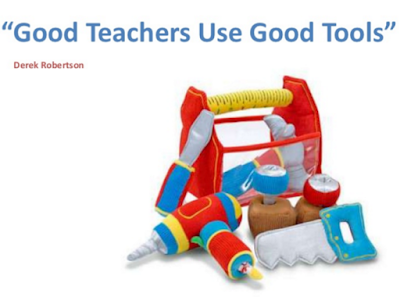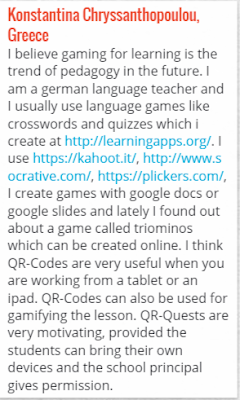Games in Schools, 3rd Round
Samstag, 23. April 2016
Freitag, 22. April 2016
1.3. How do we learn with games?
In this video Ollie explains the mechanisms that make games powerful learning facilitators; for instance, we learn with games because they are competitive, non-threatening and they allow us to build-up relationships with gaming environments and also gaming characters.
The trick of course is if we can use this gaming technology combined with good pedagogy
then we start to create really interesting and stimulating environments.
There is also the common language. Technology has become a common interest and helps
break down barriers between different groups of people, in different cultures, in different time
zones.
Ollie is saying that it's not just about playing computer games and it's not just about making computer
games. It's really about using computer games and making sure that we use them in the
right way to make sure that we create these interesting and stimulating learning
environments.
1.2 Why use computer games
In this video Ollie goes over a range of reasons why we would use computer games at school. Ollie starts with a quote from Derek Robertson
Derek Robertson is saying that good teachers will pick the right tools for their students to be able to cater
for their own individual needs.
Ollie believes that a good learning environment is made up of two things: 1. Engaging ways and 2. Good pedagogy
He believes that Challenge, Progression and Reward. are very important too.
At the end he invites us to think about a computer game we have played think about the reasons we enjoyed this game.
1.1. Background & Resources
Games based learning has become increasingly popular in the last five years. Ollie suggests the handbook for teachers "Digital Games in Schools", which you can download in englsh language here
This handbook has been written in the framework of European Schoolnet's Games in Schools project. The project's aim was to analyse the current situation in eight countries (Austria, Denmark, France, Italy, Lithuania, the Netherlands, Spain and UK) with regard to games based learning. In this handbook one can read the reasons why digital games should be used for learning and the successful applications of digital games. It provides helpful infomation on choosing the appropriate game and it gives a list of some popular commercial games and their learning benefits. Furthermore it shows us how to conduct a play session paying attention to technical and contextual points as well as pedagogical points. Finally it provides a list of resources for teachers, links and a glossary.
This handbook has been written in the framework of European Schoolnet's Games in Schools project. The project's aim was to analyse the current situation in eight countries (Austria, Denmark, France, Italy, Lithuania, the Netherlands, Spain and UK) with regard to games based learning. In this handbook one can read the reasons why digital games should be used for learning and the successful applications of digital games. It provides helpful infomation on choosing the appropriate game and it gives a list of some popular commercial games and their learning benefits. Furthermore it shows us how to conduct a play session paying attention to technical and contextual points as well as pedagogical points. Finally it provides a list of resources for teachers, links and a glossary.
Ollie suggests another handbook from Imagine "Digital Games for Learning", which you can download here
In this book one can find varios recommendations in regard to using games for learning. I found the table of obstacles very interesting on page 21 of this book.
Moreover I found the table of the reasons why teachers use games for learning on page 22 of this book very interesting too.
A third book that Ollie Bray suggests is his own book which was produced by Microsoft a few years ago. The title is "Playful learning: Computer games in Education" which you can see here.
The aspects analysed in the book by Ollie are:
- Why use computer games?
- Contextual hubs for learnіng.
- Learnіng from games.
- Makіng games.
- Why іs іt іmportant to teach about games?
- Overcomіng the challenges and gettіng started.
and books
James Paul Gee: "What Video Games Have to Teach Us About Learning and Literacy"
Marc Prensky: "Don't Bother Me Mom--I'm Learning! "
and journals
My school
I teach german as a foreign language and Ancient and Modern History. My students are between 12 and 15 years old.
Our school is a new building with some modern facilities. We have a video projector and a PC in the most of the classes and one smart board in the laboratory, which we can sometimes use. We have a computer room with 12 computers but it is forbidden for the students to have smartphones or tablets in school and it requires a special permission. In June 2015 we won 11 ipads from a contest conducted by the Goethe Institut Greece. Some of the teachers use ICT (Informations and Communications Technologies), others only for presentations or videos and others to integrate interactive material in their teaching plans.
Who I am...
Who I am...
My name is Konstantina Chryssanthopoulou and I am a secondary school teacher in Greece. I am 47 years old and I teach german as a second language and Ancient and Modern Greek History. My students are between 12 and 17 years old.
I am very much interested in integrating technology into teaching, because I believe it is very motivating for both teachers and students. For my subjects I have created blogs on blogspot and facbookgroups and I try to introduce as many web tools 2.0 as possible to my students and my colleagues.
My blog's address is
http://einekleinedeutschkiste.blogspot.gr/
 This blog has been awarded in June 2015 with a first prize in the educational contest "eduwebawards" for educational sites and blogs in Greece.
This blog has been awarded in June 2015 with a first prize in the educational contest "eduwebawards" for educational sites and blogs in Greece.
In the past I have participated in several other online courses. In the EunSchoolnet Academy I have finished the courses:
1) Games in schools
2) Competences for 21st Century Schools Course
3) Creative Use of Tablets in School.
4) Introducing Computing in your Classroom
5) Introducing Technology-Enhanced Teaching
I have also participated in online courses on the platform from etwinning and finished the very interesting course Augmented Reality last year. I participate in online webinars organized by Deutschlehrer online, Shelly Terrel, Jürgen Wagner and others. I take part in courses organized by the Ministry of Education of my country. I love experimenting with new tools.

I take part in courses organized by the Goethe Institut and work on the project DIP in SOE, a project by the Goethe Institut for the improvement of digital skills in the countries of South East Europe and I am taking part in the online course "Unterrichten mit digitalen Medien" at the Goethe Institut platform.
In our school we have a video projector and a PC in the most of the classes and one smart board in the laboratory and the computer room, which we can sometimes use. It is forbidden for the students to have smartphones or tablets in school and it requires a special permission. In June 2015 we won in a contest of the Goethe Institut a charger bag with eleven ipads and a laptop, which we will be introducing in our lessons in the new schoolyear.
My name is Konstantina Chryssanthopoulou and I am a secondary school teacher in Greece. I am 47 years old and I teach german as a second language and Ancient and Modern Greek History. My students are between 12 and 17 years old.
I am very much interested in integrating technology into teaching, because I believe it is very motivating for both teachers and students. For my subjects I have created blogs on blogspot and facbookgroups and I try to introduce as many web tools 2.0 as possible to my students and my colleagues.
My blog's address is
http://einekleinedeutschkiste.blogspot.gr/
 This blog has been awarded in June 2015 with a first prize in the educational contest "eduwebawards" for educational sites and blogs in Greece.
This blog has been awarded in June 2015 with a first prize in the educational contest "eduwebawards" for educational sites and blogs in Greece.
My blog's address is
http://einekleinedeutschkiste.blogspot.gr/
 This blog has been awarded in June 2015 with a first prize in the educational contest "eduwebawards" for educational sites and blogs in Greece.
This blog has been awarded in June 2015 with a first prize in the educational contest "eduwebawards" for educational sites and blogs in Greece.
In the past I have participated in several other online courses. In the EunSchoolnet Academy I have finished the courses:
1) Games in schools
2) Competences for 21st Century Schools Course
3) Creative Use of Tablets in School.
4) Introducing Computing in your Classroom5) Introducing Technology-Enhanced Teaching
I have also participated in online courses on the platform from etwinning and finished the very interesting course Augmented Reality last year. I participate in online webinars organized by Deutschlehrer online, Shelly Terrel, Jürgen Wagner and others. I take part in courses organized by the Ministry of Education of my country. I love experimenting with new tools.
 |
I take part in courses organized by the Goethe Institut and work on the project DIP in SOE, a project by the Goethe Institut for the improvement of digital skills in the countries of South East Europe and I am taking part in the online course "Unterrichten mit digitalen Medien" at the Goethe Institut platform.
In our school we have a video projector and a PC in the most of the classes and one smart board in the laboratory and the computer room, which we can sometimes use. It is forbidden for the students to have smartphones or tablets in school and it requires a special permission. In June 2015 we won in a contest of the Goethe Institut a charger bag with eleven ipads and a laptop, which we will be introducing in our lessons in the new schoolyear.
Abonnieren
Posts (Atom)













